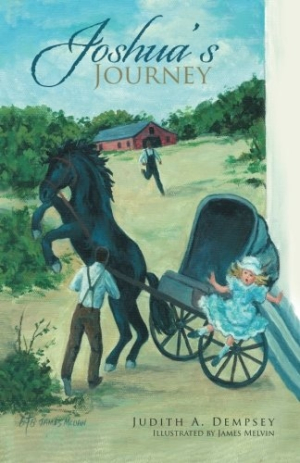Joshua's Journey
This is a well-crafted introduction to the realities of racial prejudice.
Judith Dempsey’s powerful and inspiring Joshua’s Journey chronicles the life of a young black boy born at the end of the Civil War. He learns the value of freedom and the importance of education while dealing with prejudice in the segregated South.
Joshua Jordan is a twelve-year-old living and working with his aunt and uncle on a North Carolina plantation. When an unforeseen accident causes serious injury to the plantation owner’s daughter, Joshua meets the challenge of tracking down a reclusive Native American healer who will hopefully provide the decoctions necessary to restore the girl’s health. This event is the impetus for Joshua’s own journey to become a doctor. Amid the positive influence of benefactors and career mentors, family and friends, he experiences racial injustices and learns important life lessons along the path to achieving his dreams.
Dempsey creatively reveals the story through the engaging reminiscences and flashbacks of an elderly Doctor Joshua Jordan. The narrative is propelled forward by the concerned questions of Joshua’s daughter and the inquisitive nature of his twin grandsons, who always seem anxious to hear about his life experiences.
Transitions are smooth between the past and present as Dempsey’s artful and descriptive writing draws immediate attention to the charms of the old South. Dempsey’s choice dialogue suggests an authenticity of Southern dialect; language and phrasing reflect an era where individuals were labeled as “colored” and “negro.” The sole incidence of the inflammatory “N” word is spoken by a drunk and deranged character.
While the narrative showcases Joshua as the first member of his family born beyond the shackles of slavery, Dempsey brings the authenticity of that freedom into question. Ultimately, the emphasis is on liberty and opportunity through education, but racial inequality is pointedly detailed at the same time.
In the story, separate entrances for black people, lower-level seating and sleeping quarters aboard public transport, and the noted intolerance of the KKK are all present, capturing the derogatory mentality of the era. There is also fuel for hope in Joshua’s reflection that “someday things are gonna’ change.”
While this is a fictional work geared toward a younger audience, Dempsey heightens the factual dimension with references to historical black figures, as well as to renowned educational institutions that provided an opportunity for higher learning. Chapters are filled with the idea of knowledge passing down from one generation to the next.
Life lessons about hard work, higher education, and never allowing anyone to diminish your dreams are brought full circle, wisely shared by the central character. James Melvin’s simple black-and-white illustrations lend an old-fashioned feel to the book while providing a subtle highlight to the narrative’s key events.
For juvenile readers, this is a well-crafted introduction to the realities of racial prejudice. Blending traditional stylings and themes of historical relevance, Joshua’s Journey strikes a chord.
Reviewed by
Carol Davala
Disclosure: This article is not an endorsement, but a review. The publisher of this book provided free copies of the book and paid a small fee to have their book reviewed by a professional reviewer. Foreword Reviews and Clarion Reviews make no guarantee that the publisher will receive a positive review. Foreword Magazine, Inc. is disclosing this in accordance with the Federal Trade Commission’s 16 CFR, Part 255.

